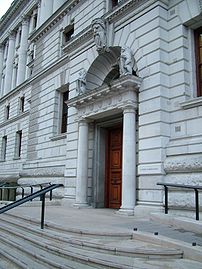By Anthony Faiola and Mary Jordan
Washington Post Staff Writers
Saturday, March 28, 2009
Once as rooted in the Scottish soil as this city's famous castle, the Royal Bank of Scotland ventured far during the era of globalization -- pumping billions of dollars worth of credit overseas as it expanded into markets as diverse as Kazakhstan, China and Rhode Island.
But just as RBS came to symbolize the free flow of credit across borders, the worldwide financial crisis has turned it into a leading example of the reverse: protectionism in the 21st century.
The government took majority control of the venerable bank four months ago after it suffered the worst corporate loss in British history. Authorities promptly issued a fresh directive: RBS, which had been in private hands since 1727, would have to sharply boost lending to British companies and home buyers stung by the global credit crunch -- effectively curtailing lending to its equally hard-hit customers overseas. As RBS prepares to comply with the government order to pump billions of dollars more into British credit markets, it is retrenching in at least 15 countries, moving to sell off branches from Vietnam to Romania.
In the United States, where RBS operates the nation's 10th largest bank, the company recently sold off 65 subsidiary branches in Indiana and scaled back auto loan operations in Texas, Colorado, Oklahoma and Arizona.
World leaders gathering for a major economic summit in London next week are vowing not to repeat the trade wars of the 1930s by imposing the kind of protectionist tariffs on butter, steel and other goods that deepened the Great Depression. But while their promises center largely on avoiding classic forms of trade barriers -- such as higher taxes on imported cars -- the rise of financial protectionism poses a far greater threat to global recovery.
British Bank To the World Takes Its Cash Back Home - washingtonpost.com
![Reblog this post [with Zemanta]](http://img.zemanta.com/reblog_a.png?x-id=c57794b1-9eab-4633-89c6-192ed171337b)

![Reblog this post [with Zemanta]](http://img.zemanta.com/reblog_a.png?x-id=6704e8d0-33fe-4341-8637-d594ca84a8b2)

![Reblog this post [with Zemanta]](http://img.zemanta.com/reblog_a.png?x-id=b0180163-300f-4a48-b062-7151509f0273)

![Reblog this post [with Zemanta]](http://img.zemanta.com/reblog_a.png?x-id=09e3e56f-af4e-4ef0-acae-adc586a5e44e)

![Reblog this post [with Zemanta]](http://img.zemanta.com/reblog_a.png?x-id=4ddca536-06fa-4c7a-9d3d-09df1b3d8b29)


![Reblog this post [with Zemanta]](http://img.zemanta.com/reblog_a.png?x-id=a8dcde94-225c-4255-ac89-52cd8fd4f123)

![Reblog this post [with Zemanta]](http://img.zemanta.com/reblog_a.png?x-id=aa4ba13e-9fcc-4808-aade-f29195c1d602)

![Reblog this post [with Zemanta]](http://img.zemanta.com/reblog_a.png?x-id=27edbfaa-5a54-420b-9a75-9e6e29d4e5d7)

![Reblog this post [with Zemanta]](http://img.zemanta.com/reblog_a.png?x-id=47d33a3e-d140-4997-9c66-cee3199055b7)
![Reblog this post [with Zemanta]](http://img.zemanta.com/reblog_a.png?x-id=a77d4874-9daa-4610-a734-eb976ac3a795)
![Reblog this post [with Zemanta]](http://img.zemanta.com/reblog_a.png?x-id=7457105c-4cdf-4a52-8a17-e6ec69ff7cb8)

![Reblog this post [with Zemanta]](http://img.zemanta.com/reblog_a.png?x-id=31d09df9-5a71-4a68-8337-59ee61f5f35e)

![Reblog this post [with Zemanta]](http://img.zemanta.com/reblog_a.png?x-id=a761750d-ba4c-4ec9-9c4e-85b1351364a3)

![Reblog this post [with Zemanta]](http://img.zemanta.com/reblog_a.png?x-id=b1f4abe4-c567-423b-8804-35f51f437114)

![Reblog this post [with Zemanta]](http://img.zemanta.com/reblog_a.png?x-id=9204627e-0122-4ead-bf68-07ecdabedbc0)

![Reblog this post [with Zemanta]](http://img.zemanta.com/reblog_a.png?x-id=94174b2d-11a5-40e3-930a-80b365977963)

![Reblog this post [with Zemanta]](http://img.zemanta.com/reblog_a.png?x-id=61707093-8b0d-4aa6-9d5b-d41c879d5216)

![Reblog this post [with Zemanta]](http://img.zemanta.com/reblog_a.png?x-id=d9428bcd-38dd-4bda-b577-101133bea229)

![Reblog this post [with Zemanta]](http://img.zemanta.com/reblog_a.png?x-id=2fccfa50-3235-4586-9b8a-0a6cbe5300de)

![Reblog this post [with Zemanta]](http://img.zemanta.com/reblog_a.png?x-id=5515f58f-e701-4bdb-a984-5fa02abd35b2)

![Reblog this post [with Zemanta]](http://img.zemanta.com/reblog_a.png?x-id=79801f19-b961-4145-9891-7d7b3e924f38)

![Reblog this post [with Zemanta]](http://img.zemanta.com/reblog_a.png?x-id=d9512367-c0e6-4818-93f1-dc7441480a7e)

![Reblog this post [with Zemanta]](http://img.zemanta.com/reblog_a.png?x-id=d189c4a5-196d-49c3-b202-562a0018fa6c)

![Reblog this post [with Zemanta]](http://img.zemanta.com/reblog_a.png?x-id=177d2696-510e-4049-b8fb-8dec027d29df)

![Reblog this post [with Zemanta]](http://img.zemanta.com/reblog_a.png?x-id=ff91de37-ecab-4508-a239-1c5949ecc96c)

![Reblog this post [with Zemanta]](http://img.zemanta.com/reblog_a.png?x-id=9f9d89c0-3c2e-48a7-9664-35dbadef0ad0)